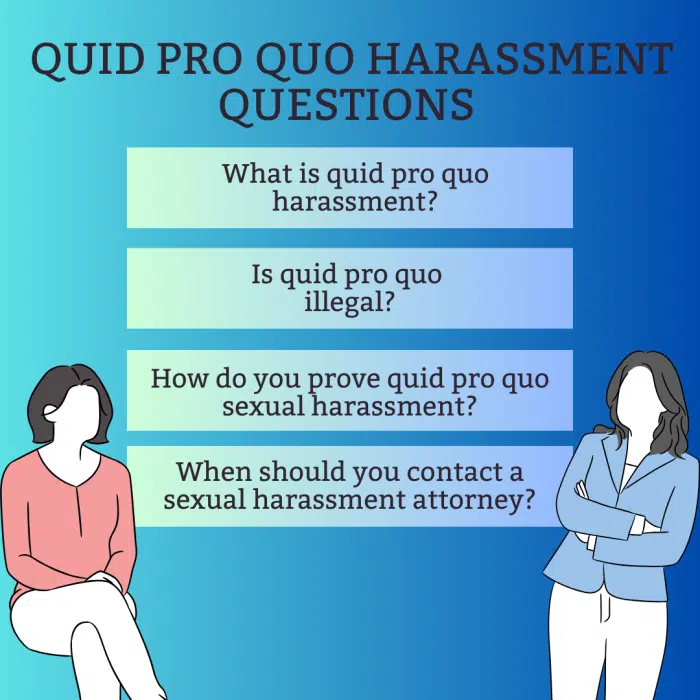What is Quid Pro Quo Sexual Harassment?
You’ve heard the phrase “quid pro quo.” But what does it mean? And what counts as quid pro quo harassment at work?
Quid pro quo harassment is a type of sexual harassment. It means pressuring an employee for sexual favors. And it’s against the law.
Millions of Americans experience sexual harassment at work. Knowing the definition of quid pro quo harassment can help you protect your rights.
What is quid pro quo harassment?
Quid pro quo, a type of sexual harassment, occurs when the harasser pressures an employee for sexual acts with the threat of punishments or the promise of rewards.
What counts as “sexual favors”? The law defines this broadly, including requests for sex or sexual acts and pressure to go on a date or engage in any form of sexual intimacy, such as a kiss.
The harasser might promise a reward such as a job offer, promotion, or raise in exchange for sexual favors. Or the harasser might threaten the victim with termination, a pay cut, or a bad review.
What does quid pro quo mean?
Literally, “quid pro quo” means “this for that” in Latin. But what does quid pro quo mean in the law?
Legally, quid pro quo means an exchange of favors. For example, a supervisor pressuring an employee for sexual favors in exchange for a promotion or raise qualifies as quid pro quo harassment. So does a boss threatening to fire an employee if they won’t perform sexual acts.
What is quid pro quo sexual harassment?
Quid pro quo sexual harassment occurs when a worker faces pressure from a supervisor for sexual favors, backed by either threats or promises.
This type of sexual harassment has these key characteristics:
- Either a promise for work favors or a threat for work punishments
- Pressure on the victim to provide sexual favors
- The perpetrator has the power to reward or punish the victim
If the harassment lacks one of these characteristics, it may still violate sexual harassment laws. A quid pro quo lawyer can help you determine whether you have a case.
Contact sexual harassment lawyer Charles Joseph for a free, confidential consultation.
Which of the following is an example of quid pro quo sexual harassment?
Test your understanding of quid pro quo sexual harassment. Which of the following describes quid pro quo sexual harassment?
- A hiring manager promises to get someone a job in exchange for sex.
- A boss pressures his employee to go on a date if she wants to succeed at the company.
- An employee forwards sexually explicit images to coworkers.
- A supervisor threatens to fire an employee who rejects their advances.
All four examples count as sexual harassment. However, #3 is not quid pro quo harassment because it does not involve a favor exchange.
What if it’s not quid pro quo harassment? Learn about other types of sexual harassment.
Is quid pro quo illegal?
Yes, quid pro quo harassment is illegal. Requiring sexual favors in exchange for favorable treatment at work violates Title VII of the Civil Rights Act.
In a quid pro quo harassment lawsuit, courts look for evidence of an exchange of favors. Emails, text messages, or other written evidence can help you prove your case. So can witnesses and your own testimony.
Proving Quid Pro Quo Sexual Harassment
In order to prove quid pro quo harassment, you’ll need evidence to support your claim. That can include texts, emails, witness testimony, and your testimony about what happened.
What if you didn’t reject the harasser? You can still file a lawsuit.
In a quid pro quo lawsuit, your employer has to prove that your relationship was fully consensual and not influenced by threats or promises. If the harasser threatened your job security or promotion, your employer will have a hard time proving it was consensual.
If you’re in this situation, don’t feel ashamed – when your livelihood is at risk, you may feel like you have no choice. A sexual harassment attorney will empathize with you. The harasser should feel ashamed, which is why these cases often settle early without a public court filing.
When to Contact a Quid Pro Quo Lawyer
Requiring sexual favors at work is illegal. If you’ve faced quid pro quo harassment, a quid pro quo attorney can help you collect evidence, build a strong case, and file a quid pro quo lawsuit.
Quid pro quo harassment is only one type of sexual harassment. Employers have a responsibility to prevent sexual harassment at work, including verbal sexual harassment, physical harassment, and hostile work environments. If you’ve experienced sexual harassment at work, a sexual harassment lawyer can help you determine whether you have a case.
Reach out to Charles Joseph, a sexual harassment attorney, for a free, confidential consultation to learn how to file a sexual harassment lawsuit.
You can also read more about your sexual harassment rights: Sexual Harassment Rights, Laws, and Potential Damages
Related FAQs

